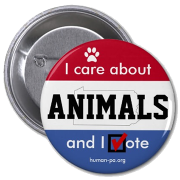Guest Blog by Kristen Tullo
On Saturday, April 15, the Pennsylvania Game Commission (PGC) voted on a proposed change to regulations to allow wild animal exhibitors (such as roadside zoos and fairs) to sell public contact experiences with most wildlife. Unfortunately, this rule passed with a vote of 6-3.
Dissenting votes are uncommon on the PGC, and we are grateful that Commissioners Pride, Mitrick, and Schwalm declined to
support the proposed rule. We also appreciate that Commissioner Pride moved to table the vote, with support from Commissioners Mitrick and Schwalm v. Unfortunately, that motion also failed (6-3).
How disappointing it is that Pennsylvania will now move backward on this issue when public opinion and laws in other states are trending in the opposite direction.
This new rule places both the public and animals at risk.
Here are answers to some of the questions you may have:
What is the status of the bill to undo this terrible setback ? A bill (H.B. 1451) sponsored by state Rep. Joe Hohenstein, D-Phila., which would protect the public from unsafe encounters with wild animals, passed the House today by vote of 109-94. See more here: Hohenstein bill protecting public from wild animals passes House, Please contact your state senator to support this important bill.
The legislation was proposed following a decision by the Pennsylvania Game Commission to move away from a safety measure that prohibited direct contact between the public and wildlife, particularly exotic wildlife.
How many petting/roadside zoos are there in PA?
There are approximately 74 facilities with active USDA exhibitor licenses in PA, though not all are considered “roadside zoos.” This new rule will open Pennsylvania to more exhibitors that view our state as a new market to expand businesses that use and mistreat wild animals for profit.
Which wildlife species will this vote affect?
This vote will allow public contact with most wild animals. This is a change to the previous rule that only allowed public contact with a few species. However, there were some small wins for animals in this vote. Public contact will continue to be prohibited with bears, wild cats (tigers, lions, cheetahs), and canids (foxes, wolves, coyotes). Thanks to an amendment, public contact will be prohibited with all primates.
How will this rule change harm animals?
Increasing opportunities for the public to handle and touch wild animals is cruel and dangerous. Wild animals used in these exhibits are often over-bred; infants are prematurely separated from mothers; and animals are subjected to rough and excessive handling as they are forced to endure human contact at such facilities. Rabies vaccines are not licensed for use in wild animals, so wild and exotic animals who bite humans may require euthanasia or quarantine.
How will this rule change harm people?
Allowing increased public contact puts people in substantial danger of being injured by bites and scratches from frightened and overwhelmed animals, and it increases the likelihood of transmission of zoonotic diseases. Before this rule change, data from the Humane Society of the United States showed that Pennsylvania had only experienced two dangerous incidents related to public contact since 1990, accounting for less than half of a percent of nationwide statistics. The decision taken threatens to undermine Pennsylvania’s record and public safety in this regard.
This regulation change will also increase the burden on game wardens and others working at the state level to ensure safety compliance.
How will this rule change affect conservation?
Public handling encourages people to buy exotic animals as pets, diminishes and undermines their awareness of animals’ plight in the wild, and reduces donations to conservation programs. For these reasons, it is important to never “like” or “share” photos on social media that depict people interacting with wild animals.
What advocacy occurred in preparation for this vote?
Thanks to the hard work and dedication of Pennsylvania advocates, 100% of commissioners received communication from their constituents asking them to vote against the proposed rule. In addition, several experts presented oral testimony before the commission including the Humane Society of the United States and Humane Animal Rescue Wildlife Rehabilitation Center. The HSUS, along with various national partner organizations, also submitted written comments to the PGC.
Where can I watch the recording of the vote?
You can watch the recording of the April 15th PGC meeting here: https://www.youtube.com/watch?v=-4e9BRjzoRQ&t=3s. The menagerie rule vote occurs between 49:07 and 54:54.
How can I take action in response to this vote?
Despite our disappointment in the outcome, we want you to know that your voices were heard, and this fight is not over! Here are three ways you can help!
- Email your commissioner and express your feelings about how they voted!
- Find your commissioner here based on your county and send your commissioner an email at pgccomments@pa.gov.
- If your commissioner is Commissioner Pride, Mitrick, or Schwalm, thank them for voting against the menagerie rule change and for voting in support of tabling the vote.
- If your commissioner is Commissioner Schnepp-Giger, Fredericks, Foradora, Sankey, DiMarco, or Knick, express your disappointment that they voted for the rule change.
- Contact your state legislators (you can find them here), and ask them to co-sponsor and support Representative Joseph Hohenstein’s bill to “Protect the Public from Contact with Wildlife.”
- Write a Letter to the Editor expressing your disappointment with the PGC’s vote and submit it to your local newspaper.
Kristen Tullo is the Pennsylvania State Director of the Humane Society of the United States. She graduated with a master’s degree in Community Psychology at Pennsylvania State University focusing her attention on animal welfare initiatives. She led the campaign to secure passage of House Bill 1238 (Libre’s Law), which overhauled Pennsylvania’s Cruelty Law, and was instrumental in the formation of Pennsylvania’s bipartisan and bicameral Animal Protection Caucus




